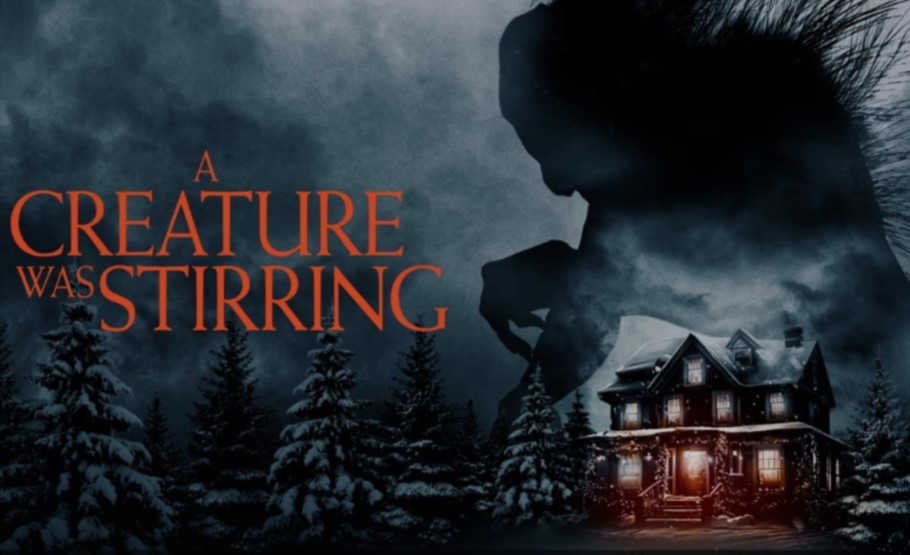Top 20 Most Popular Holidays and Festivals in December 2024 (Around the World)
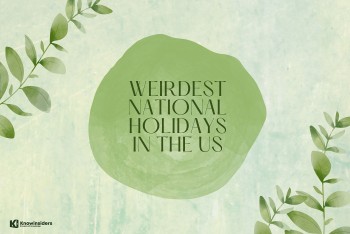 10 Weirdest US National Holidays: Ex-Spouse, Squirrel, Bubble Wrap , Repeal, Mad Hatter 10 Weirdest US National Holidays: Ex-Spouse, Squirrel, Bubble Wrap , Repeal, Mad Hatter |
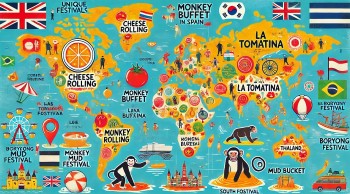 Top 20 Weirdest Holidays and Festivals in the World 2025 Top 20 Weirdest Holidays and Festivals in the World 2025 |
Overview
December 2024 is packed with festivals and holidays that bring warmth and cheer to the coldest season for many. While some holidays have religious roots, others celebrate culture, heritage, or natural phenomena like the Winter Solstice. Whether it’s the global observance of Christmas or the regional festivities of Las Posadas in Mexico, each event has unique customs and deep meanings.
The following list highlights the 20 most celebrated holidays and festivals in December 2024, providing insights into their dates, locations, historical significance, and ways of celebration. This guide invites you to appreciate and participate in the diverse festive spirit of December.
 |
| Top 20 Most Popular Holidays and Festivals in December |
1. Christmas (December 25)
Christmas, celebrated on December 25, is one of the most globally recognized holidays. Rooted in Christian tradition, it commemorates the birth of Jesus Christ. Over time, it has grown to encompass secular traditions as well, making it a universal celebration of joy, generosity, and togetherness.
- Significance: While central to Christianity, Christmas has become a cultural holiday that emphasizes love, kindness, and family.
- Celebrations:
- Decorating Christmas trees and homes with lights and ornaments.
- Exchanging gifts, which stems from the Biblical story of the Wise Men offering gifts to baby Jesus.
- Attending church services, particularly midnight mass, which is a key spiritual aspect of Christmas for many.
- Traditional meals vary by region: roast turkey and Christmas pudding in the UK, tamales in Mexico, and seafood feasts in Italy.
Santa Claus, known by various names worldwide, is a central figure for children, who eagerly await his arrival with gifts. Modern celebrations often include music, movies, and community events.
2. Hanukkah (December 25, 2024 – January 2, 2025)
Hanukkah, also known as the Festival of Lights, is an eight-day Jewish celebration starting on December 25 in 2024. It commemorates the rededication of the Second Temple in Jerusalem and the miracle of the menorah.
- Significance: Hanukkah represents faith, resilience, and the triumph of light over darkness.
- Celebrations:
- Lighting a candle on the menorah each night and reciting blessings.
- Playing dreidel games, where each side of the dreidel carries a Hebrew letter representing a phrase meaning "A great miracle happened here."
- Eating oil-based foods such as latkes (potato pancakes) and sufganiyot (jelly doughnuts) to honor the oil miracle.
- Singing traditional songs and spending time with family.
This holiday is both religious and cultural, fostering community gatherings, charity, and acts of kindness.
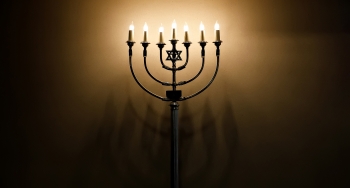 Happy Hanukkah - Jewish Holiday: Meaning, History and Celebration Happy Hanukkah - Jewish Holiday: Meaning, History and Celebration |
3. New Year's Eve (December 31)
New Year's Eve is celebrated worldwide as the final day of the year, leading to the grand countdown to midnight. It symbolizes the closing of one chapter and the beginning of another.
- Significance: New Year’s Eve is both a reflection on the past year and a celebration of hope and aspirations for the next.
- Celebrations:
- Global cities host massive fireworks displays, with Sydney, New York, and London being particularly iconic.
- Parties, concerts, and countdowns are held to welcome the new year.
- Traditional foods include grapes in Spain (eaten for luck at each stroke of midnight) and soba noodles in Japan for longevity.
- Many people make New Year’s resolutions to improve aspects of their lives.
The event is also deeply symbolic in many cultures, tied to renewal, prosperity, and letting go of the past.
 |
| New Year's Eve |
4. Kwanzaa (December 26 – January 1)
Kwanzaa, observed from December 26 to January 1, is a celebration of African heritage and unity, introduced by Dr. Maulana Karenga in 1966.
- Significance: Kwanzaa emphasizes seven core principles: unity, self-determination, collective work, cooperative economics, purpose, creativity, and faith.
- Celebrations:
- Lighting the Kinara, where each of the seven candles represents one principle.
- Storytelling, drumming, and dancing to honor African culture and traditions.
- A communal feast (Karamu) on December 31, featuring traditional African dishes and customs.
The holiday is not religious but cultural, providing a space for African Americans to reflect on their heritage and contributions to society.
5. Winter Solstice (December 21)
The Winter Solstice is an astronomical event marking the shortest day and longest night of the year in the Northern Hemisphere.
- Significance: Celebrated across ancient cultures, the solstice symbolizes rebirth and renewal as the days gradually grow longer.
- Celebrations:
- Ancient traditions included lighting bonfires to honor the return of the sun.
- Modern Pagans celebrate Yule, incorporating rituals like burning Yule logs, feasting, and decorating with evergreen.
- Stonehenge in England becomes a pilgrimage site for solstice celebrations.
The solstice is a time of introspection, gratitude, and celebration of nature’s cycles.
6. Boxing Day (December 26)
Boxing Day, celebrated the day after Christmas, originated in the UK as a day for charity and gifting to servants and the less fortunate.
- Significance: Traditionally, it was a time to share the wealth and reflect on gratitude.
- Celebrations:
- Modern traditions include shopping sales, sports events (such as football in the UK), and family gatherings.
- In some countries, like Australia and Canada, outdoor activities like hiking and picnics are popular.
Boxing Day blends history, charity, and modern leisure, making it a multifaceted holiday.
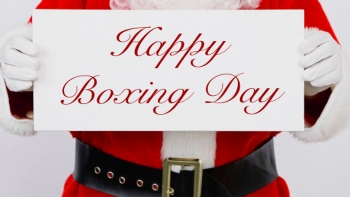 Boxing Day December 26th: Meaning and Celebrations around the world Boxing Day December 26th: Meaning and Celebrations around the world |
7. St. Nicholas Day (December 6)
St. Nicholas Day, celebrated in parts of Europe, honors the historical St. Nicholas, a 4th-century saint known for his generosity.
- Significance: St. Nicholas is the inspiration for Santa Claus, and the holiday focuses on giving and kindness.
- Celebrations:
- Children leave out shoes or stockings to receive small gifts or treats.
- Parades, church services, and feasts are held in his honor.
- Special pastries, such as speculaas cookies in the Netherlands, are enjoyed.
This day is a charming mix of religious devotion and joyful traditions for children.
8. Las Posadas (December 16–24)
Las Posadas, a nine-day festival in Mexico, reenacts Mary and Joseph’s search for lodging before the birth of Jesus.
- Significance: A deeply spiritual event, it prepares for Christmas by reflecting on faith and hospitality.
- Celebrations:
- Daily processions through neighborhoods with candles and songs.
- Piñatas shaped like stars are broken open, symbolizing hope and joy.
- Families gather for tamales, atole, and festive gatherings.
Las Posadas blends religious devotion with communal unity and joy.
9. Hogmanay (December 31)
Hogmanay is Scotland’s traditional New Year celebration, marked with unique customs and vibrant festivities that date back to Viking times.
- Significance: Hogmanay’s origins are tied to Norse traditions, celebrating the winter solstice and the end of the harvest. Today, it reflects Scotland’s love for community, music, and good luck rituals.
- Celebrations:
- First-Footing: The first person to enter a home after midnight brings gifts (such as coal, whiskey, or shortbread) to ensure good fortune.
- Massive street parties in cities like Edinburgh, including torchlight processions, fireworks, and music festivals.
- Singing "Auld Lang Syne," a poem by Robert Burns, to bid farewell to the old year.
Hogmanay stands out with its fiery traditions, such as swinging blazing fireballs in Stonehaven, symbolizing purification and renewal.
10. Feast of Our Lady of Guadalupe (December 12)
Celebrated in Mexico, the Feast of Our Lady of Guadalupe honors the Virgin Mary’s appearance to Juan Diego in 1531.
- Significance: Our Lady of Guadalupe is a national symbol of faith and unity in Mexico, embodying the fusion of indigenous and Catholic traditions.
- Celebrations:
- Pilgrimages to the Basilica of Guadalupe in Mexico City, where her image is enshrined.
- Parades featuring traditional costumes, music, and dancing.
- Offering roses, candles, and prayers to honor Mary’s role as the protector of Mexico.
This deeply spiritual event attracts millions of devotees annually, making it one of the most significant Catholic celebrations in Latin America.
 |
| December Holidays and Festivals |
11. Saturnalia (December 17–23)
Saturnalia was an ancient Roman festival honoring Saturn, the god of agriculture and time.
- Significance: Saturnalia celebrated the end of the harvest and the promise of renewal. Its traditions inspired many modern Christmas customs, such as gift-giving and feasting.
- Celebrations:
- Role reversals, where slaves dined with their masters, symbolizing equality.
- Decorated homes with greenery and candles to mark the solstice.
- Public feasts, games, and exchanging of wax figurines as gifts.
Though no longer celebrated today, Saturnalia’s influence persists in contemporary holiday traditions.
12. Yule (December 21)
Yule, a Pagan and Nordic festival, celebrates the winter solstice and the rebirth of the sun.
- Significance: Rooted in Norse mythology, Yule marks the turning point of the year when the days begin to lengthen. It is a time to honor the sun and nature.
- Celebrations:
- Burning the Yule log to symbolize light and warmth overcoming darkness.
- Decorating homes with evergreens like holly and ivy, representing life’s resilience.
- Feasting, storytelling, and wassailing (singing to orchards to ensure a good harvest).
Modern Wiccans and Pagans continue to observe Yule, blending ancient rituals with contemporary celebrations.
13. Omisoka (December 31)
Omisoka, or Japanese New Year’s Eve, is a time for spiritual and physical cleansing in preparation for the new year.
- Significance: Rooted in Shinto and Buddhist traditions, Omisoka symbolizes letting go of the past and welcoming new beginnings.
- Celebrations:
- Cleaning homes (ōsōji) to clear out negativity and start fresh.
- Eating Toshikoshi soba, long noodles symbolizing longevity.
- Visiting shrines for Hatsumode, the first prayer of the new year.
Omisoka is a serene, family-oriented holiday that bridges the old and new years with grace and gratitude.
14. Bodhi Day (December 8)
Bodhi Day is a Buddhist holiday commemorating Siddhartha Gautama’s enlightenment under the Bodhi tree.
- Significance: Bodhi Day is a reminder of the path to enlightenment and the values of meditation, compassion, and mindfulness.
- Celebrations:
- Meditation and chanting sessions to reflect on Buddha’s teachings.
- Decorating Bodhi trees with lights and beads.
- Offering food, particularly tea and cookies shaped like hearts or leaves, symbolizing Buddha’s awakening.
This peaceful holiday encourages introspection and a deeper understanding of spiritual truths.
15. Festival of Lights in Lyon (December 8)
The Festival of Lights, or Fête des Lumières, transforms Lyon, France, into a dazzling display of illumination.
- Significance: It began in 1852 as a religious celebration honoring the Virgin Mary but has evolved into a cultural event showcasing Lyon’s artistic heritage.
- Celebrations:
- Stunning light installations across the city’s landmarks.
- Candlelit displays in homes and windows as a nod to tradition.
- Street performances, music, and vibrant parades.
Attracting millions of visitors annually, this festival blends art, history, and faith.
16. Sinterklaas (December 5)
Sinterklaas, celebrated in the Netherlands, is the precursor to Santa Claus traditions.
- Significance: Sinterklaas Day honors Saint Nicholas, the patron saint of children, sailors, and merchants.
- Celebrations:
- Children place shoes by the fireplace for gifts from Sinterklaas and his helpers.
- Enjoying treats like chocolate letters, speculaas cookies, and marzipan.
- Parades featuring Sinterklaas arriving on a steamboat.
This beloved holiday emphasizes generosity and festive cheer.
 |
| December Holidays and Festivals |
17. Fiesta de Santo Tomás (December 21)
Fiesta de Santo Tomás is celebrated in Chichicastenango, Guatemala, honoring Saint Thomas the Apostle.
- Significance: This holiday blends Mayan and Catholic traditions, highlighting Guatemala’s cultural diversity.
- Celebrations:
- Traditional dances, including the famous Palo Volador ritual, where performers swing from a pole in colorful costumes.
- Vibrant street markets selling crafts and local delicacies.
- Processions and religious ceremonies in honor of Saint Thomas.
The festival is a vibrant showcase of Guatemalan culture and spirituality.
18. Dongzhi Festival (December 21)
The Dongzhi Festival, celebrated in China and East Asia, marks the arrival of winter.
- Significance: Dongzhi symbolizes harmony and balance, as it marks the turning point when daylight begins to increase.
- Celebrations:
- Families gather to eat tangyuan (sweet glutinous rice balls), symbolizing reunion.
- Honoring ancestors through rituals and offerings.
- Sharing seasonal foods like dumplings in Northern China to stay warm.
Dongzhi is both a culinary and spiritual celebration, emphasizing family unity.
19. St. Lucia’s Day (December 13)
St. Lucia’s Day, celebrated in Scandinavia, honors Saint Lucia, a symbol of light in the darkness of winter.
- Significance: St. Lucia is a Christian martyr associated with bringing hope and light during difficult times.
- Celebrations:
- Processions led by a "Lucia" wearing a crown of candles.
- Traditional saffron buns (Lussekatter) and hot drinks are shared.
- Singing songs that reflect light, faith, and community.
St. Lucia’s Day beautifully combines faith and Scandinavian folklore.
20. Krampusnacht (December 5)
Krampusnacht, or "Krampus Night," is celebrated in Central Europe, particularly in Austria and Bavaria, featuring the fearsome Krampus.
- Significance: Krampus is a mythical creature who punishes naughty children, contrasting with the benevolent Saint Nicholas.
- Celebrations:
- Parades where participants dress as Krampus, complete with horns, bells, and chains.
- Storytelling sessions about Krampus and his role in Christmas folklore.
- Sharing spiced mulled wine (Glühwein) and festive treats.
Krampusnacht blends dark folklore with festive fun, adding a unique twist to the holiday season.
Conclusion
December is a month of extraordinary diversity and joy, offering a vivid tapestry of traditions, beliefs, and celebrations. It encapsulates the spirit of togetherness, reflection, and renewal as people across the globe mark the closing of one year and the promise of a new beginning. Whether it’s the deep religious significance of Christmas and Hanukkah, the cultural pride of Kwanzaa and Las Posadas, or the festive cheer of New Year’s Eve and Hogmanay, each holiday tells a unique story of humanity's resilience, creativity, and hope.
The global celebrations in December remind us that, despite our differences, we are united by a shared desire to honor our heritage, express gratitude, and spread love and light. By exploring and participating in these holidays, we enrich our understanding of the world, forge deeper connections with others, and embrace the universal values of peace, generosity, and unity. December’s festivals invite us to celebrate life in all its forms, making this month truly special and unforgettable.
FAQs
Q1. Why is December so rich in holidays and festivals?
December marks the end of the year and the beginning of longer days (in the Northern Hemisphere). Many cultures and religions use this time to reflect on renewal, gratitude, and hope. Additionally, historical traditions such as harvest festivals and solstice celebrations evolved into many of the holidays we recognize today.
Q2. What are the most celebrated holidays in December globally?
The most celebrated December holidays include Christmas, observed by billions of Christians and non-Christians alike; Hanukkah, a significant Jewish festival; and New Year’s Eve, which is celebrated universally. Other notable holidays like Kwanzaa, the Winter Solstice, and Boxing Day also hold considerable global significance.
Q3. Are all December holidays tied to religion?
No, not all December holidays are religious. For example:
- New Year’s Eve is a cultural event tied to the Gregorian calendar.
- The Winter Solstice and Yule celebrate astronomical and seasonal changes.
- Festivals like Hogmanay and Krampusnacht are rooted in cultural traditions rather than religion.
Q4. How do people celebrate December holidays around the world?
Celebrations vary greatly depending on the holiday and region. Common elements include:
- Religious observances like church services (Christmas) or menorah lighting (Hanukkah).
- Cultural traditions such as gift-giving, feasting, and music (Kwanzaa, Sinterklaas).
- Seasonal activities like decorating homes, enjoying fireworks (New Year’s Eve), or honoring nature (Winter Solstice).
Traveling during December or engaging in local cultural events is a wonderful way to experience these diverse celebrations.
Q5. How can I respectfully participate in holidays from other cultures?
Participating in holidays from other cultures is a great way to expand your perspective and foster inclusion. Here are some tips:
- Research: Learn the meaning and customs of the holiday beforehand.
- Ask Questions: If invited to celebrate, ask hosts about traditions and practices.
- Be Respectful: Dress appropriately, observe rituals sincerely, and avoid actions that may be considered offensive.
- Focus on Connection: Celebrate the values of the holiday, such as gratitude, generosity, and community.
Q6. What is the oldest holiday celebrated in December?
The Winter Solstice, celebrated for millennia in cultures worldwide, is the oldest known December holiday. Festivals like Saturnalia in Ancient Rome and Yule in Nordic traditions were rooted in solstice observances, symbolizing light and renewal.
Q7. Are there holidays in December for non-religious people?
Absolutely. Many December holidays, such as New Year’s Eve, the Winter Solstice, and Dongzhi Festival, are non-religious and focus on cultural or seasonal themes. These celebrations often emphasize family, nature, and hope for the future.
Q8. Why are December holidays important for mental health and well-being?
The holidays provide opportunities for connection, gratitude, and joy, which are essential for mental well-being. They encourage people to spend time with loved ones, take a break from daily stress, and participate in traditions that bring happiness and a sense of belonging.
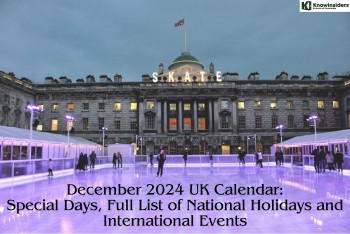 UK Calendar in December 2024: Special Days, Full List of National Holidays and International Events UK Calendar in December 2024: Special Days, Full List of National Holidays and International Events In the United Kingdom, December is a month of celebration, contemplation, and revelry as the year winds down, thanks to its abundance of national holidays, ... |
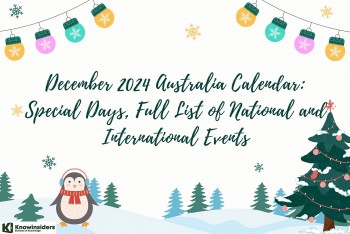 Australia Calendar in December 2024: Full List of National Holidays, Special Days and International Events Australia Calendar in December 2024: Full List of National Holidays, Special Days and International Events Australia's December is a lively month, with a mix of state holidays, special events, and holiday celebrations that show off the country's rich cultural diversity. ... |
 December 2024 US Calendar: Special Days, Full List of National Holidays and International Events December 2024 US Calendar: Special Days, Full List of National Holidays and International Events Each December day in the US offers opportunities for reflection, celebration, and family connection. December is full of meaning, unity, and goodwill, from religious to ... |
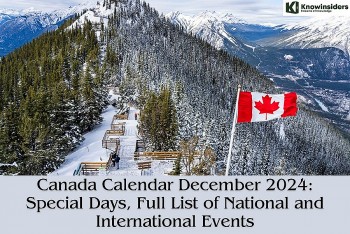 Canada Calendar December 2024: Special Days, Full List of National Holidays and International Events Canada Calendar December 2024: Special Days, Full List of National Holidays and International Events As the year comes to a close, Canada comes alive with a variety of national days, special observances, and festivals that highlight the rich cultural ... |


